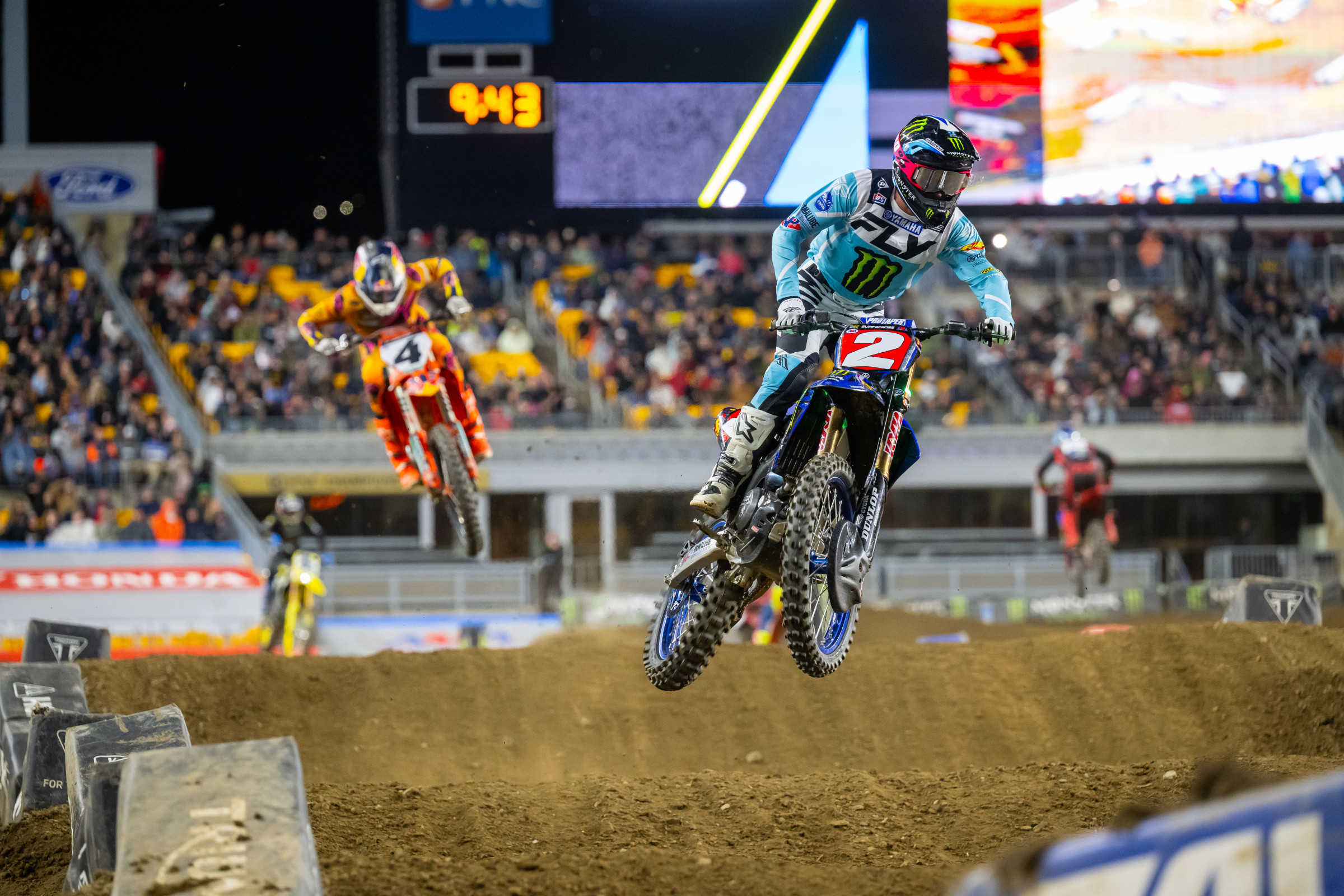Monster Energy AMA Supercross was back in Pittsburgh for the first time since 1983, and boy oh boy did it deliver! The racing was wild, the championship landscapes changed, and of course, plenty of questions were raised. To get answers, we tapped former pro and NBC pit reporter Jason Thomas.
The last time supercross raced in Pittsburgh was 1983, so this was a new city, new dirt, and a new venue for supercross. Were there any curve balls encountered on this front?
I think the weather was the only real variable that riders had to worry about. The rest was about as good as could be asked. The track was technical but safe, the dirt had traction but didn’t fall apart, and the stadium was packed. Pittsburgh was a huge win on all fronts.
There was a split lane section. How did the different lines stack up? Was one clearly better than the other, or was the potential advantage all up to rider execution?
This was a tricky section that changed many times throughout the day and night. In qualifying, the tabletop was much steeper and made that option less viable. Before the night program, they flattened it a bit and brought that line back into play.
In the early heat races, it seemed the outside line was quicker, and most riders opted for it. Justin Cooper turned that on its head with his ability to triple on and step to the inside. He made passes there and big time gains each lap. Without tripling on and stepping to the inside, though, that line didn’t work.
In the end, there was no consensual answer. For most, the outside line seemed to be the best and most consistent. If you could triple on with speed and step off, though, you could change that equation a bit. Tricky question to answer in an absolute way.
The whoops looked nasty. How much of a role did they play in the outcome of the night’s main events?
They were and have been the most critical variable of the main events. In East Rutherford, blitzing was lethal and Sexton wielded his skill like a samurai sword. Pittsburgh was the opposite end of that spectrum. Jumping became the only viable solution and Webb executed it cleanly and consistently while Sexton struggled. Two difficult whoop sets, two different approaches, two different results accordingly. There is a lot that goes on during a main event and it’s not fair to boil it down to one section but if you were forced to, you wouldn’t need to look further than the whoops for a determining factor.
Max Vohland was incredible in Pittsburgh. Is this a culmination of a slow burn, or was there something specific about the way he gelled with this track that resulted in his first career podium?
I think it’s been brewing. He’s shown flashes as he’s continued to improve. Remember, he’s not simply returning to form after his serious leg injury. He’s having to relearn how to race. All of his muscle memory with his right foot, braking zones, techniques, etc., is being rewritten. That would take time for anyone to accomplish, if ever. If anything, I think he’s ahead of schedule.
Talk about the pressure Seth Hammaker must have been feeling when forced to come from behind in the 250SX main event. Not only was he racing for a championship, he was doing it in front of his hometown crowd.
Funny thing, I don’t think he really felt pressure. He would likely feel more pressure if he was leading. When you have a big problem like he did on the first lap, instincts take over. There simply isn’t time to think or worry. He had to react and do everything humanly possible to minimize the damage. He will feel plenty of pressure in Salt Lake City but that Pittsburgh scenario was much more “fight or flight” than the nervousness of leading.
Tom Vialle got his first win of the season in Pittsburgh, and at the best possible time—he’s now back in the points lead! How does this affect his mindset at the finale in Salt Lake City in two weeks?
His back was against the wall going into Pittsburgh. If he lost more points to Hammaker and RJ Hampshire in Pittsburgh, the championship was essentially over for him. The only possible way he could have a chance was to win and then take it to Utah. It was as simple as that. This was about as clutch as a ride as I’ve seen in the 250 class. He still has to do it again in SLC but this was a huge, huge step.
| Position | Rider | Hometown | Points |
|---|---|---|---|
| 1 |  Tom Vialle Tom Vialle | Avignon, France | 180 |
| 2 |  Seth Hammaker Seth Hammaker | Bainbridge, PA | 177 |
| 3 |  R.J. Hampshire R.J. Hampshire | Hudson, FL | 173 |
| 4 |  Nate Thrasher Nate Thrasher | Livingston, TN | 137 |
| 5 |  Cullin Park Cullin Park | Clermont, FL | 131 |
Dean Wilson and Dylan Ferrandis had a spicy battle in their heat race. We know HRC Honda Progressive passed Ferrandis over as a replacement rider for Wilson, does this factor into things on the track?
I think there is a little extra because of it, yes. I don’t think Dylan has hard feelings toward Deano or Honda, it’s just extra motivation. Dylan wants to beat Dean every single time so every Honda decision maker has to look at the results and think about it every weekend. I feel very confident that Honda is happy with their decision but for Dylan, you take whatever fuel you can derive from the situation and keep pushing forward. Good results only bring things, regardless of how they arrive.
Neither Cooper Webb nor Chase Sexton won their heat races. Did that affect either of them mentally going into the 450SX main event?
Judging by how the main event went, I don’t believe so. I did, however, think Sexton would struggle with how his heat race unfolded. When Justin Cooper went by, Sexton seemed to get a bit rattled. He was unable to respond and actually dropped further back. Mentally, I think he was caught off guard by the burst that J-Coop had and wasn’t sure how or where it came from. He regrouped, though, and came out swinging to fight Webb in the main.
| Position | Rider | Hometown | Points |
|---|---|---|---|
| 1 |  Cooper Webb Cooper Webb | Newport, NC | 365 |
| 2 |  Chase Sexton Chase Sexton | La Moille, IL | 363 |
| 3 |  Justin Cooper Justin Cooper | Cold Spring Harbor, NY | 281 |
| 4 |  Malcolm Stewart Malcolm Stewart | Haines City, FL | 277 |
| 5 |  Ken Roczen Ken Roczen | Mattstedt, Germany | 271 |
How much pressure did this win take off of Webb’s shoulders?
It can’t be overstated. The difference between six points and 12 points feels like 40. Nothing is guaranteed and racing is far too unpredictable to count Sexton out but for the “feel” of this championship, it was monumental. Webb can race situationally from here where Sexton has to win both races and hope he gets help from others. The math and likely scenarios changed significantly and everyone involved knows it. If Sexton had won that main event, the pressure on Webb would be ratcheted up to an 11 going into Denver. Now, he has a little bit of flexibility to work with.









